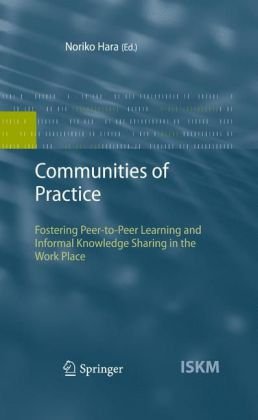Noriko Hara Ph.D. (auth.)3540854231, 978-3-540-85423-4, 978-3-540-85424-1
The book offers two themes: one is about Communities of Practice (CoPs) and learning, the other is about social informatics approaches. First, in order to facilitate designing effective learning environments both online and offline, this book calls attention to the importance of CoPs to facilitate informal learning as part of professional development. Communities of Practice are informal networks that support a group of practitioners to develop a shared meaning and engage in knowledge building among the members. The concept of CoPs is rooted in situated cognition (Brown, Collins, & Duguid, 1989; Lave, 1988) and the socio-cultural theory (Vygotsky, 1978).
The book examines how people share and construct their knowledge by using case studies of public defender’s offices. Despite strong interests among practitioners and scholars, empirical studies of CoPs are sparse. Drawing on theories from situated cognition and social informatics, this book investigates what constitutes a community of practice and how members of the community create a shared meaning in workplaces with and without IT.
Table of contents :
Front Matter….Pages i-xi
Introduction….Pages 1-6
Theoretical Foundation….Pages 7-23
Ethnographic Accounts of a Community of Practice in Square County….Pages 25-46
Characteristics of a Community of Practice in Square County….Pages 47-78
Communities of Practice and Information Technologies in the Circle County Public Defender’s Office….Pages 79-94
Online Communities of Practice: Beyond Organizational Boundaries….Pages 95-111
Toward an Understanding of Communities of Practice….Pages 113-124
Back Matter….Pages 125-137







Reviews
There are no reviews yet.